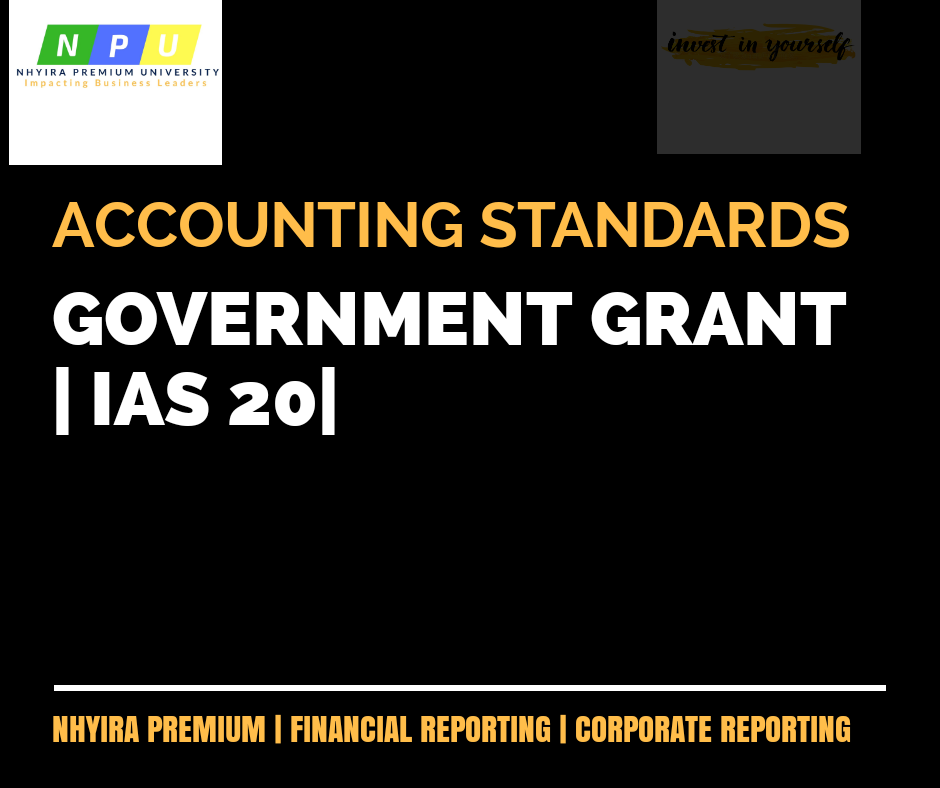Module objectives:
After going through this module, you will be able to:
- Understand the recognition criteria of Grants
- Measurement basis
- Disclosure requirements
1.1. Introduction
Objective of IAS 20
The objective of IAS 20 is to prescribe the accounting for, and disclosure of, government grants and other forms of government assistance.
Scope
IAS 20 applies to all government grants and other forms of government assistance. [IAS 20.1] However, it does not cover government assistance that is provided in the form of benefits in determining taxable income. It does not cover government grants covered by IAS 41 Agriculture, either. [IAS 20.2] The benefit of a government loan at a below-market rate of interest is treated as a government grant. [IAS 20.10A]
Accounting for grants
A government grant is recognised only when there is reasonable assurance that (a) the entity will comply with any conditions attached to the grant and (b) the grant will be received. [IAS 20.7]
The grant is recognised as income over the period necessary to match them with the related costs, for which they are intended to compensate, on a systematic basis. [IAS 20.12]
Non-monetary grants, such as land or other resources, are usually accounted for at fair value, although recording both the asset and the grant at a nominal amount is also permitted. [IAS 20.23]
Even if there are no conditions attached to the assistance specifically relating to the operating activities of the entity (other than the requirement to operate in certain regions or industry sectors), such grants should not be credited to equity. [SIC-10]
A grant receivable as compensation for costs already incurred or for immediate financial support, with no future related costs, should be recognised as income in the period in which it is receivable. [IAS 20.20]
A grant relating to assets may be presented in one of two ways: [IAS 20.24]
- as deferred income, or
- by deducting the grant from the asset’s carrying amount.
A grant relating to income may be reported separately as ‘other income’ or deducted from the related expense. [IAS 20.29]
If a grant becomes repayable, it should be treated as a change in estimate. Where the original grant related to income, the repayment should be applied first against any related unamortised deferred credit, and any excess should be dealt with as an expense. Where the original grant related to an asset, the repayment should be treated as increasing the carrying amount of the asset or reducing the deferred income balance. The cumulative depreciation which would have been charged had the grant not been received should be charged as an expense. [IAS 20.32]
[vooplayer type=”video” id=”NjMxMzM=” float=”left-25%” ]
1.2. Question
When the client company buys asset which allows the government to give the client grants, then this has to be treated in the financial statement as follows:
There are two issues to be considered:
- Matching principles
Example:
“The government paid a grant of $10m when the client company purchased an asset of $100m in Nov. 2009. The useful life of the asset is 10 years. “- an extract from ACCA past question
Required: state the audit risk.
Solution:
To answer this question, we first consider
The accounting issues: That’s how the transaction should be treated in the financial statement.
According to IAS 20 – Government Grants, on receipt of grant it should be deferred over the useful life of the asset.
On receipt:
| Particulars | Debit ($) | Credit ($) |
| Property, Plant & Equipment | 100 | |
| Cash (cost of asset) | 100 | |
| Cash | 10 | |
| Deferred income (grant received ) | 10 |
At the end of year 1
| Particulars | Debit ($) | Credit ($) |
| Income statement (Depreciation- 100/10) | 10 | |
| Property, Plant & Equipment | 10 | |
| Deferred income – $10/10 years | 1 | |
| Income statement | 1 |
- Repayment:
Existence:
Inspect the government grant document to ensure if it actually happened.
Condition:
Whether there is a condition attached to the grant received. Enquire from management a written representation to confirm the conditions are true and inspect document and ask lower level staff.
- Repayment:
If the conditions are not achievable, it means repayment must be paid. Then there will be provisions in relation to the repayment.
1.3. Disclosure of government grants
The following must be disclosed: [IAS 20.39]
- accounting policy adopted for grants, including method of balance sheet presentation
- nature and extent of grants recognised in the financial statements
- unfulfilled conditions and contingencies attaching to recognised grants
Government assistance
Government grants do not include government assistance whose value cannot be reasonably measured, such as technical or marketing advice. [IAS 20.34] Disclosure of the benefits is required. [IAS 20.39(b)]
Bibliography
- Association of Certified Chartered Accountants – United Kingdom BPP F7
- Institute of Chartered Accountants – Ghana – Study Manual
- London School and Business and Finance
- COM
- com
- Premium Education Hub’s Library
- Lecturer’s Book on Management Accounting
Enroll in the course here

